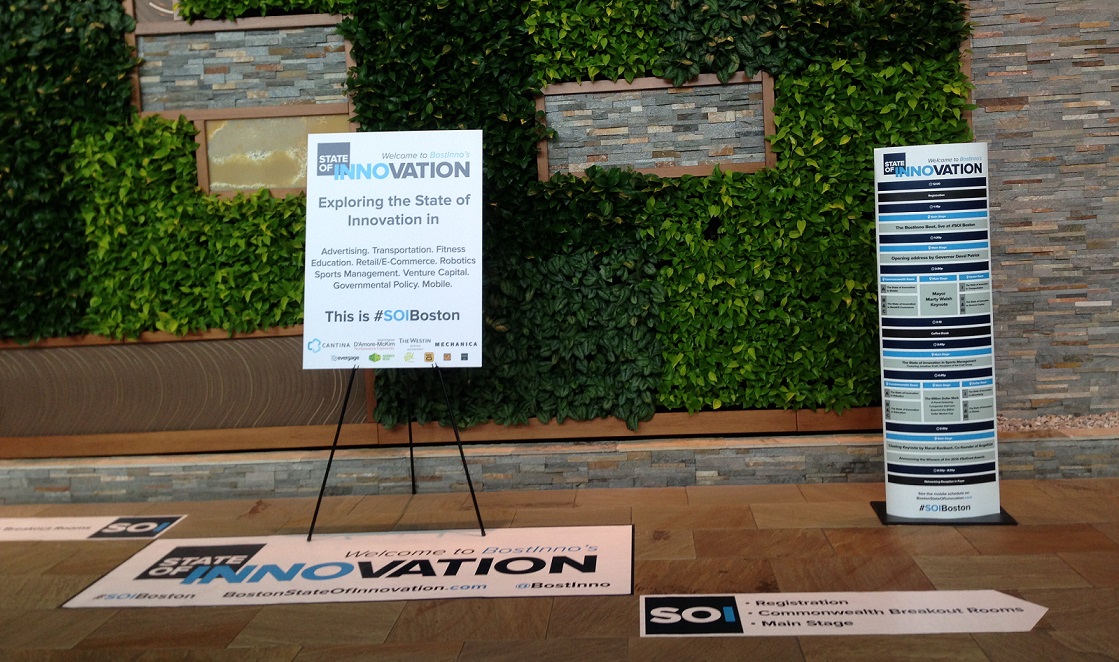Last Thursday, I had the privilege of attending BostInno’s annual State of Innovation event, held at the Westin Boston Waterfront, where around 1,000 leaders and innovators in Boston tech, eCommerce, marketing and other innovation-centric industries converged to discuss the latest and greatest in their fields.

State of Innovation featured keynotes from Boston Mayor Marty Walsh and AngelList cofounder Naval Ravikant, and 10 industry-focused panels. I sat in on the Retail/eCommerce and Advertising panels, both of which confirmed my impression that those spaces are undergoing some major disruptions.
Retail/eCommerce
Boston entrepreneurs Greg Selkoe, CEO and founder of Karmaloop, and Mark Bollman, president and founder of Ball and Buck, were among the participants of the eCommerce panel, which revealed interesting differences in how businesses that are primarily e-retailers (like Karmaloop) approach their online strategy, versus those that are primarily brick-and-mortar stores (like Ball and Buck).
For example, Selkoe said Karmaloop’s top priority is keeping users on its website for as long as possible—the best way for the online-only business to optimize conversions. Alternatively, the primarily brick-and-mortar Ball and Buck has to maintain a distinct in-store personality, so Bollman said its digital efforts must serve to drive traffic to its Newbury location, where customers can interact directly with knowledgeable employees (although the company has an active online store, too).
But despite different business models, both companies agreed that mobile web optimization, not merely mobile “friendliness,” is key to success. In fact, Karmaloop brings in 45 percent of sales via mobile devices, so a seamless mobile shopping experience is one of the company’s top priorities. And Rue La La’s CTO Susan Standiford, another panelist, went so far as to say Rue La La is a “mobile first” company.
Advertising
As commerce changes direction, with mobile, social and web presence paramount for any type of business, marketing approaches are following suit. This came out during the Advertising panel, which featured Boston ad tech companies like DataXu, clypd, and Mechanica, and highlighted how today’s marketing and advertising professionals are approaching technology like data analytics and personalization to drive better results online.
For example, personalized approaches like native advertising have raised controversy, with some seeing them as effective use of good content, while others view them as invasive and blurring the lines between editorial and advertisement.
Panel moderator Anne Weiskopf, VP business development at Digiday, pointed out that sponsored content doesn’t get shared as much as pure editorial. However, Mechanica CEO Ted Nelson observed that the customer journey is nonlinear and involves many points of contact—including traditional ads, word of mouth and personalized ads—and the skill of brand builders today is to balance these and keep the narrative moving in the right direction.
Boston Tech Needs Innovative Storytelling
A clear takeaway: for communicators and brand advocates, the trends explored at the State of Innovation should be top of mind. As industries evolve, and are shaped by online interaction and the volumes of data we now create, approaches to storytelling simply can’t be stuck in the past.



